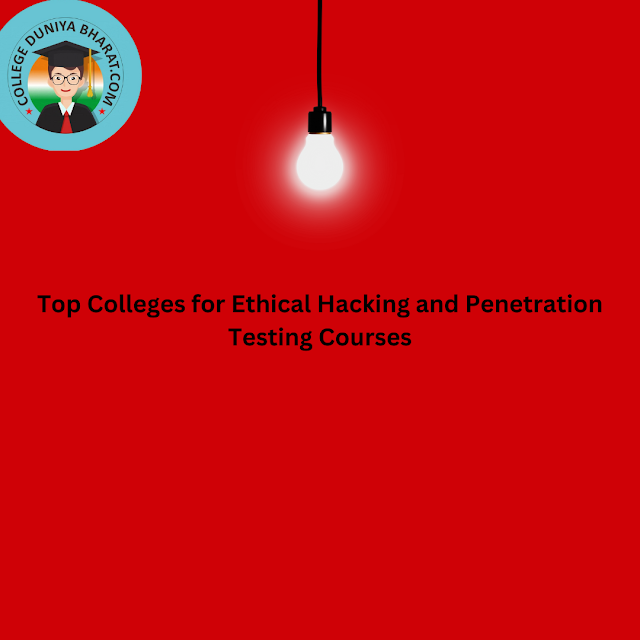Top Colleges for Ethical Hacking and Penetration Testing Courses
In an era dominated by digital transformation, cybersecurity has become a top priority for organizations worldwide. Ethical hacking and penetration testing are critical components of cybersecurity, helping businesses identify vulnerabilities and strengthen their defenses against cyber threats. As the demand for skilled ethical hackers continues to rise, many universities are offering specialized courses and programs to prepare students for this challenging and rewarding field. This blog highlights the top colleges globally for ethical hacking and penetration testing courses in 2025.
Why Pursue Ethical Hacking and Penetration Testing?
Ethical hacking, also known as penetration testing or white-hat hacking, involves simulating cyberattacks to identify and fix security vulnerabilities. Here are some reasons to pursue a career in this field:
-
High Demand: Cybersecurity professionals are in high demand, with ethical hackers playing a vital role in protecting sensitive data.
-
Lucrative Career Opportunities: Ethical hackers often enjoy competitive salaries and job stability.
-
Challenging and Dynamic Work: This field offers exciting challenges, requiring constant learning and adaptation to evolving threats.
-
Global Impact: Ethical hackers contribute to global cybersecurity efforts, making the digital world safer for everyone.
Top Colleges for Ethical Hacking and Penetration Testing
Here are the leading institutions offering top-notch education and training in ethical hacking and penetration testing:
1. Massachusetts Institute of Technology (MIT), USA
MIT is renowned for its cutting-edge technology programs, including cybersecurity and ethical hacking.
Key Highlights:
- Courses on cybersecurity, network security, and ethical hacking.
- Access to state-of-the-art labs and research facilities.
- Collaboration opportunities with leading tech companies.
Notable Program:
- Cybersecurity and Internet Policy Program with penetration testing modules.
2. Stanford University, USA
Stanford’s location in Silicon Valley provides students with unparalleled access to cybersecurity resources and industry connections.
Why Stanford?
- Courses on cryptography, network security, and ethical hacking.
- Access to the Stanford Cyber Initiative.
- Collaboration opportunities with leading tech firms.
Popular Course:
- Master’s in Cybersecurity with a focus on ethical hacking.
3. Carnegie Mellon University (CMU), USA
CMU’s Information Networking Institute (INI) is a leader in cybersecurity education and research.
Unique Features:
- Courses on penetration testing, reverse engineering, and malware analysis.
- Access to the CyLab Security and Privacy Institute.
- Strong focus on practical, hands-on training.
Top Program:
- Master of Science in Information Security.
4. University of Oxford, UK
Oxford’s Department of Computer Science offers world-class programs in cybersecurity and ethical hacking.
Highlights:
- Courses on advanced penetration testing and network security.
- Access to the Cyber Security Oxford initiative.
- Collaboration opportunities with industry leaders.
Notable Program:
- MSc in Software and Systems Security with ethical hacking electives.
5. National University of Singapore (NUS), Singapore
NUS is a top choice for cybersecurity education in Asia, offering cutting-edge courses in ethical hacking.
Why NUS?
- Courses on penetration testing, cryptography, and secure coding.
- Collaboration with Singapore’s thriving tech ecosystem.
- Access to advanced research labs and facilities.
Popular Course:
- Master’s in Cybersecurity with penetration testing modules.
6. Delft University of Technology (TU Delft), Netherlands
TU Delft is a leading European institution offering comprehensive cybersecurity programs.
Key Features:
- Courses on ethical hacking, secure software engineering, and cryptography.
- Collaboration with European cybersecurity initiatives.
- Access to advanced research facilities.
Top Program:
- MSc in Computer Science with a focus on cybersecurity.
7. University of Toronto, Canada
The University of Toronto offers innovative programs in cybersecurity, focusing on ethical hacking and penetration testing.
Unique Features:
- Courses on network security, ethical hacking, and malware analysis.
- Collaboration with Canada’s tech and cybersecurity ecosystem.
- Access to the Cybersecurity Research Lab.
Notable Program:
- Master of Information with a specialization in Cybersecurity.
8. ETH Zurich, Switzerland
ETH Zurich is a global leader in technology and cybersecurity education, offering specialized courses in ethical hacking.
Why ETH Zurich?
- Focus on cryptography, penetration testing, and secure systems design.
- Collaboration with Swiss cybersecurity initiatives.
- Access to advanced research labs and facilities.
Popular Course:
- Master’s in Computer Science with cybersecurity electives.
9. Indian Institute of Technology (IIT), Bombay, India
IIT Bombay is a top institution in India, offering cutting-edge cybersecurity and ethical hacking programs.
Key Highlights:
- Courses on penetration testing, network security, and cryptography.
- Access to advanced labs and research facilities.
- Collaboration with India’s tech ecosystem.
Top Program:
- M.Tech in Computer Science with a focus on cybersecurity.
10. University of New South Wales (UNSW), Australia
UNSW offers comprehensive cybersecurity programs, focusing on ethical hacking and penetration testing.
Highlights:
- Courses on secure software development, penetration testing, and risk management.
- Collaboration with Australia’s tech and cybersecurity industries.
- Access to advanced research labs and facilities.
Notable Program:
- Master of Cybersecurity with ethical hacking modules.
Emerging Trends in Ethical Hacking Education
-
AI and Machine Learning Integration: Programs are incorporating AI to enhance penetration testing techniques.
-
Cloud Security: Focus on securing cloud-based infrastructures.
-
IoT Security: Addressing vulnerabilities in Internet of Things (IoT) devices.
-
Practical Training: Emphasis on hands-on labs and real-world simulations.
-
Global Collaboration: Universities are partnering with international cybersecurity organizations for research and training.
Conclusion
Ethical hacking and penetration testing are essential for safeguarding the digital world. The universities highlighted in this blog offer world-class education, hands-on training, and industry connections to prepare students for successful careers in cybersecurity. Whether you’re interested in advanced penetration testing techniques or secure software development, these institutions provide the foundation for a thriving career in ethical hacking.

